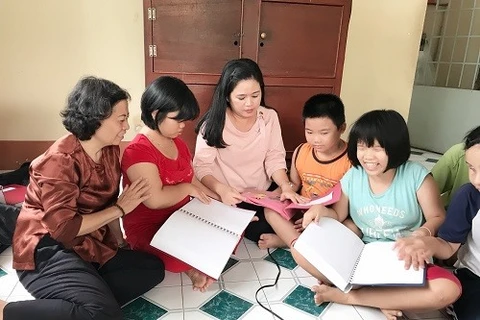 Technological applications and multimedia content are being used at Thai Nguyen Medical University in the northern province of Thai Nguyen.(Source: VNA)
Technological applications and multimedia content are being used at Thai Nguyen Medical University in the northern province of Thai Nguyen.(Source: VNA)Hanoi (VNS/VNA) - The application of financial autonomy for universities in Vietnam is still on a trial basis and remains limited, according to experts.
This means the State must make basic changes in mechanism and policies in order to create the best financial environment for universities to operate effectively.
As many as 23 universities nationwide have so far applied autonomy following the Government Resolution on pilot renewal of the operation mechanism of public tertiary education institutions during the 2014-2017 periods. Autonomy means they commit to covering all expenses for their regular operation and investment.
The resolution aims to encourage public institutions to actively tap and reasonably and effectively utilise resources to improve the quality of tertiary education, reduce State budget expenditure without limiting opportunities to access tertiary education for poor students and students being social policy beneficiaries.
However, Professor Nguyen Trong Hoai, Vice Principal of the HCM City University of Economics, said the application of financial autonomy in Vietnam still had many shortcomings.
The Government has yet had specific orientation for the transfer from pilot implementation to official implementation of the autonomy policy, causing difficulties for universities in making long-term investment plans in infrastructure and human resources development, according to Hoai.
Most of public tertiary educational institutions faced limitations in infrastructure and human resources. Meanwhile, those universities piloting autonomy faced difficulties in diversifying their sources of revenues which now chiefly came from tuition fees, he said. As a result, they would face many difficulties in stabilising their operation without any financial support from the State budget.
From international experience and the context of Vietnam, it could be seen that autonomy did not mean that the Government cut all budget for the university, he said. The State budget still played an important role for universities, creating a firm foundation for them to gradually move to the model of financial autonomy.
The Government should still provide funding for these universities, particularly in developing labs with international standards to attract domestic and foreign students and scholars to develop their research there or providing scholarships to train PhDs of international standards, Hoai said.
Former head of the Research Institute of Education Management Dang Thi Thanh Huyen said the State should adjust related mechanism, policies and administrative management over public universities.
She suggested to change investment mechanism for education to help diversify sources of revenues for universities as most public universities in Vietnam still depended on the State budget and tuition fees. The State budget should be mainly allocated for prioritised and key training areas, she said.
Other experts from the HCM City National University said the number of public tertiary educational institutions was huge while the State budget was limited. Therefore, it was time to reduce the number of public universities to improve quality and concentrate State funding for key facilities.
The State should also restructure the school system and classify training areas to improve the efficiency of education investment, they said.
Professor Hoai said university autonomy was a pathway for countries to move from State running to State supervising operation of tertiary education.
In other countries, it was coordinated between the State legal framework and self-efforts of universities. The legal framework was issued to ensure strategic public funding for university operation but still reducing the funding to motivate them to seek other sources of income; and to loosen policies for universities to diversify their sources of income to help them develop sustainably, according to Hoai.
One of the policies many Asian countries have applied was to tighten State budget. Apart from reducing State funding, China and Japan provided assistance packages for key universities instead of funding all universities as before.
State budget expenditure for education of China and Japan dropped from 83 percent to 53 percent after applying autonomy for tertiary education.
The experts from the HCM City National University said the world trend was to grant autonomy rights to public universities but the States still provided financial support in developing infrastructure and scientific research.-VNS/VNA
VNA






















